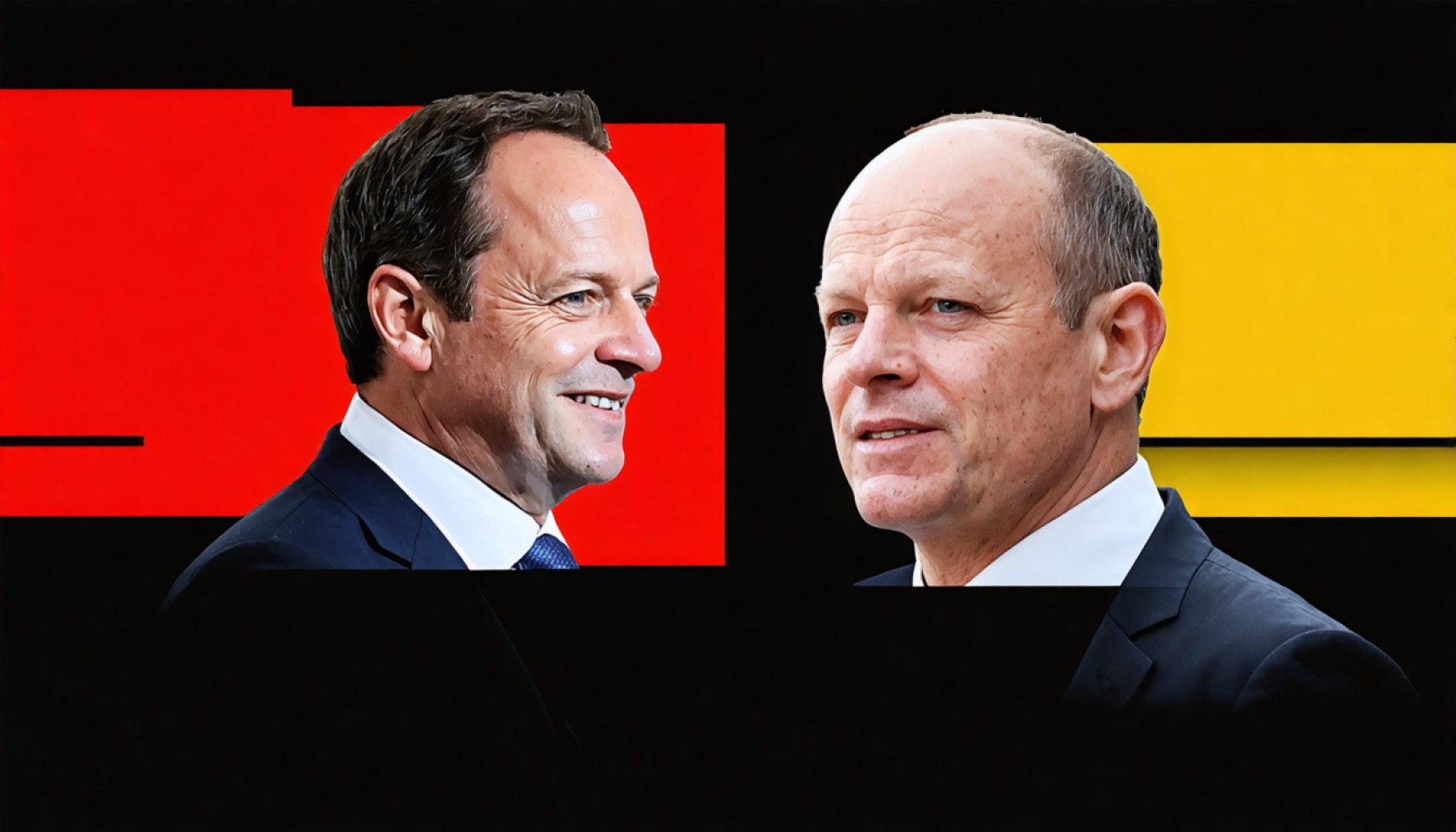- Germany faces a significant political contest between two contrasting figures: Friedrich Merz and Olaf Scholz.
- Friedrich Merz seeks to reinvent himself with composure and control, stepping back into politics with renewed focus.
- Olaf Scholz showcases newfound assertiveness, drawing on his extensive political experience to energize his campaign.
- Merz’s strategy includes leveraging his party’s solid backing to counteract electoral uncertainties.
- Scholz aims to overcome his reputation as the least popular chancellor and demonstrate his leadership capabilities.
- Both candidates’ future political careers hinge on their ability to capitalize on their unique backgrounds and experiences.
- The unfolding contest grips Germany, with the outcome set to have significant implications for the nation’s political landscape.
Germany braces for a political showdown that pits against each other two candidates as different as fire and ice. On one side, Friedrich Merz emerges from the shadows of past political tussles, donning a cloak of calmness and control to shed his impulsive and impatient image. Across the aisle, Olaf Scholz, who had once governed with a reserved steadiness, now unveils a newfound assertiveness, cutting through the campaign noise with invigorated determination.
As the narrative unfolds, cameras follow them through the rigors of electoral preparations and public appearances. Merz aims to turn his party’s unified decision to back him into a stronghold against the wavering tides of election uncertainty. Meanwhile, Scholz, despite mixed support within his party, taps into his seasoned governmental portfolio, laden with years of ministerial experience and the weight of the chancellorship under an unprecedented coalition.
With election day looming, both candidates pivot on their pasts. Merz, having once tasted the heights of political leadership only to be cast into the corporate world, eyes a dramatic return. Scholz, burdened by the label of being the least popular chancellor, seeks redemption and the chance to steer his course with newfound vigor.
As the day of decision draws nearer, the stakes reach fever pitch. Will Merz harness his fresh composure and past setbacks into a victorious return, or will Scholz, with years of political maneuvering, defy the odds to retain his chancellorship? Germany watches, waits, and wonders.
Germany’s Political Face-Off: What Lies Ahead for Merz and Scholz?
Introduction
Germany is on the cusp of a pivotal electoral battle as Friedrich Merz and Olaf Scholz stand as polar opposites vying for leadership. Each brings contrasting styles and histories to the fore, preparing the political landscape for a transformative election. Beyond the immediate electoral skirmish, there are broader implications for Germany’s political and economic direction.
How-To Steps & Life Hacks
Navigating Political Uncertainty: A Voter’s Guide
1. Assess Party Platforms: Investigate the core agendas of Merz’s CDU and Scholz’s SPD. Look at their manifestos and public statements to discern key differences in policies on issues such as climate change, economic recovery, and foreign policy.
2. Engage in Public Discourse: Join community forums or attend local political events to discuss and understand the broader public opinion. This interaction can provide insights beyond media portrayals.
3. Verify Information: In the age of misinformation, ensure your news sources are credible and diverse. Follow established news outlets and cross-reference information.
Real-World Use Cases
Leadership Styles in Government Efficiency
– Friedrich Merz: Known for his sharp business acumen, Merz’s leadership could enhance Germany’s economic policies and regulatory frameworks, potentially attracting foreign investments and fostering innovation.
– Olaf Scholz: With extensive ministerial experience, Scholz’s approach might focus on continuity and stability, prioritizing social welfare and implementing policies for a just transition in Germany’s green energy ambitions.
Market Forecasts & Industry Trends
Economic Implications of a Merz or Scholz Win
1. Under Merz: Analysts predict a surge in market liberalization and deregulation, which may stimulate the business environment. Potential tax reforms could attract multinational corporations seeking stable bases in Europe.
2. Under Scholz: Expect a continuation of socially-driven economic policies with increased investment in green technology and infrastructure, maintaining Germany’s lead in sustainable practices.
Controversies & Limitations
– Merz: Critics argue whether his corporate ties may influence policy decisions, leading to a bias toward big business.
– Scholz: Despite his experience, Scholz faces skepticism due to perceived past inaction and the challenge of leading a diverse coalition.
Pros & Cons Overview
Friedrich Merz
– Pros: Business expertise, decisive leadership, and potential for innovative economic reforms.
– Cons: Possible corporate bias and limited appeal to younger, progressive voters.
Olaf Scholz
– Pros: Experienced governmental leadership, continuity, and a focus on social and environmental policies.
– Cons: Past public dissatisfaction and potential struggles with coalition management.
Conclusion
For German voters and global observers, the impending election, featuring Friedrich Merz and Olaf Scholz, represents not just a choice between two leaders but between divergent futures for Europe’s largest economy. As both candidates hone their strategies, staying informed and critical is crucial for making an educated and impactful decision at the polls.
Quick Tips
– Stay informed on developments via reliable news outlets such as DW News.
– Participate in local electoral discussions to enhance understanding and engage with democratic processes.
In conclusion, as the electoral battle heats up, understanding the distinct approaches of Merz and Scholz is imperative for voters ready to shape Germany’s future.
